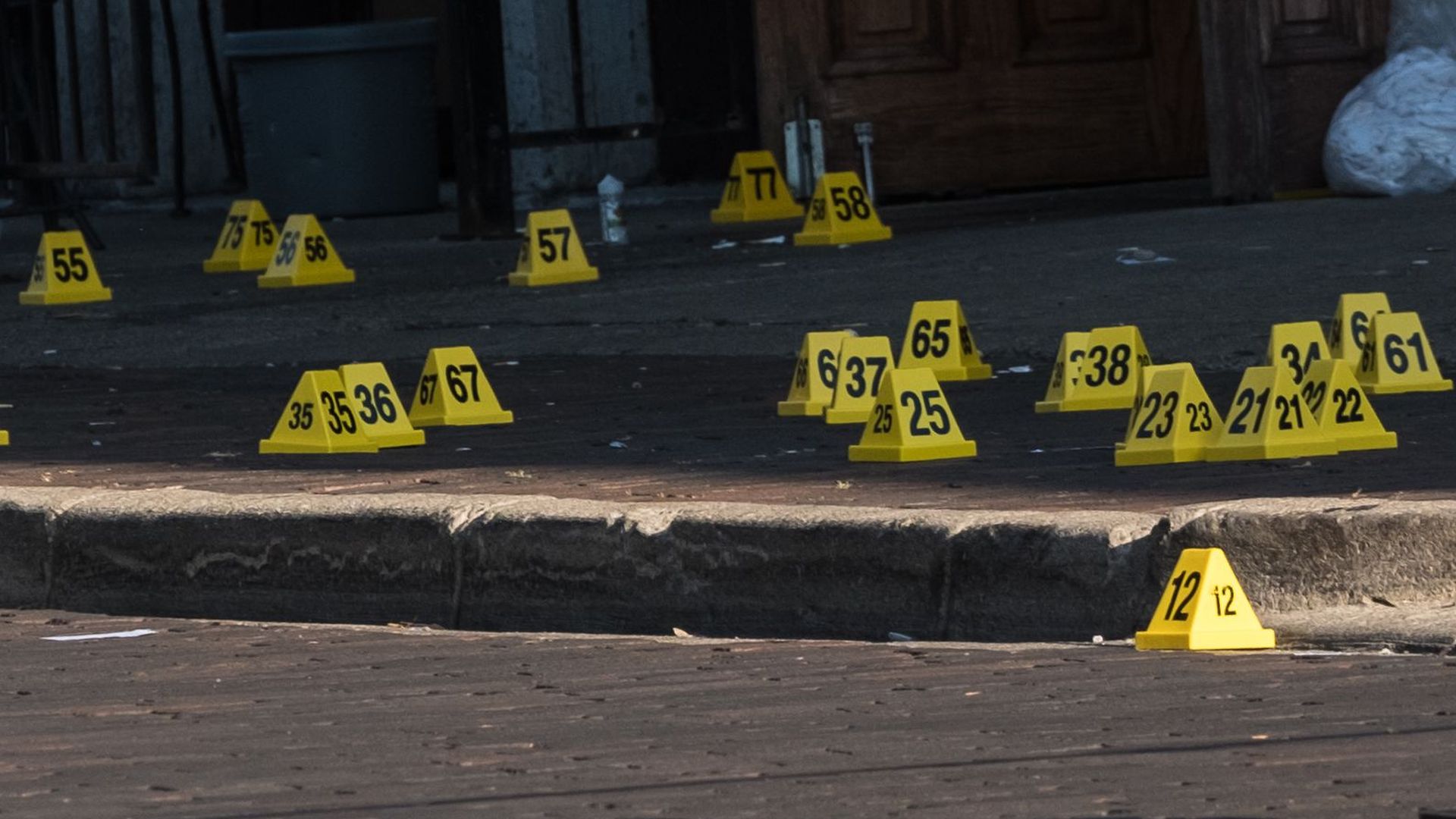America's hate problem
Add Axios as your preferred source to
see more of our stories on Google.

Police mark evidence in Dayton. Photo: Megan Jelinger/AFP/Getty Images
America has the world's worst gun problem. And now it's being forced to confront its hate problem.
The state of play: "I don't care about the politics right now," texted a friend who's in politics at the highest level. "I'm scared that we could look back on this as the beginning of a true catastrophe for America."
- The gun problem: In the 20 years since the 1999 Columbine High School massacre, the U.S. has had 88 mass shootings, with 736 killed. (Mother Jones' dataset defines a mass shooting as having 4 or more deaths; 3 or more after 2013 to match the FBI's definition).
- The hate problem: In the past 18 months, white-extremist active shooters in the U.S. have been responsible for 63 deaths in 7 episodes, including attacks on a Texas Walmart, a Florida high school, a Texas high school and a Pennsylvania synagogue, a N.Y. Times graphic shows.


As soon as I heard that the suspect in this weekend's El Paso massacre had apparently ranted online about a "Hispanic invasion," I knew the country faced dark days.
- And then a nation that has become numb to these killings awoke to news of the second massacre in 13 hours, with 9 killed overnight outside a busy bar in downtown Dayton.
Saturday's attack — which killed 22 shoppers in a Hispanic community within sight of the Mexican border — is being handled as a domestic terrorism case.
- The 21-year-old suspect told investigators he wanted to shoot as many Mexicans as possible, ABC News reported.
- "This Anglo man came here to kill Hispanics," El Paso County Sheriff Richard Wiles said.
The front pages of today's New York Times and Washington Post both explore the degree to which President Trump has exacerbated the country's hate problem, and the echoes of his language in the El Paso suspect's manifesto.
- "Trump has filled his public speeches and Twitter feed with sometimes false, fear-stoking language," The Times' Peter Baker and Mike Shear write. "Because of this, Mr. Trump is ill equipped to provide the kind of unifying, healing force that other presidents projected in times of national tragedy."
- "[T]he question surrounding the president is no longer whether he will respond as other presidents once did," The Post's Phil Rucker writes, "but whether his words contributed to the carnage."
Trump addresses the nation on the shootings at 10am, and we'll see if he gets beyond the passivity of his remarks as he left New Jersey yesterday, following a weekend at his golf resort.
- "Hate has no place in our country," he said.
- Asked about the gun problem, he replied: "[W]e have done much more than most administrations. ... But perhaps more has to be done. But this is also a mental illness problem. If you look at both of these cases, this is mental illness. These are ... really, people that are very, very seriously mentally ill. So a lot of things are happening. A lot of things are happening right now."
One Trump political ally texted that the president should "melt the Internet with an epic anti-white supremacy rant" — then admitted he won't.
- A Trump White House alumnus told me this is a "real opportunity to help heal widening divisions." But this person said they have "little confidence he will or that many others would be receptive even if he tried."
Go deeper:
Editor's note: This article has been updated to clarify that data in the chart includes 9 shootings with 3 victims, which has been the FBI's definition of a mass shooting since 2013.
